- Home
- Stephen Crane
The Little Regiment and Other Episodes of the American Civil War Page 2
The Little Regiment and Other Episodes of the American Civil War Read online
Page 2
II.
All demeanour of rural serenity had been wrenched violently from thelittle town by the guns and by the waves of men which had surged throughit. The hand of war laid upon this village had in an instant changed itto a thing of remnants. It resembled the place of a monstrous shaking ofthe earth itself. The windows, now mere unsightly holes, made thetumbled and blackened dwellings seem skeletons. Doors lay splintered tofragments. Chimneys had flung their bricks everywhere. The artilleryfire had not neglected the rows of gentle shade-trees which had linedthe streets. Branches and heavy trunks cluttered the mud in drift-woodtangles, while a few shattered forms had contrived to remain dejectedly,mournfully upright. They expressed an innocence, a helplessness, whichperforce created a pity for their happening into this cauldron ofbattle. Furthermore, there was under foot a vast collection of oddthings reminiscent of the charge, the fight, the retreat. There wereboxes and barrels filled with earth, behind which riflemen had lainsnugly, and in these little trenches were the dead in blue with the deadin gray, the poses eloquent of the struggles for possession of the townuntil the history of the whole conflict was written plainly in thestreets.
And yet the spirit of this little city, its quaint individuality, poisedin the air above the ruins, defying the guns, the sweeping volleys;holding in contempt those avaricious blazes which had attacked manydwellings. The hard earthen sidewalks proclaimed the games that had beenplayed there during long lazy days, in the careful shadows of the trees."General Merchandise," in faint letters upon a long board, had to beread with a slanted glance, for the sign dangled by one end; but theporch of the old store was a palpable legend of wide-hatted men,smoking.
This subtle essence, this soul of the life that had been, brushed likeinvisible wings the thoughts of the men in the swift columns that cameup from the river.
In the darkness a loud and endless humming arose from the great bluecrowds bivouacked in the streets. From time to time a sharp spatter offiring from far picket lines entered this bass chorus. The smell fromthe smouldering ruins floated on the cold night breeze.
Dan, seated ruefully upon the doorstep of a shot-pierced house, wasproclaiming the campaign badly managed. Orders had been issuedforbidding camp-fires.
Suddenly he ceased his oration, and scanning the group of his comrades,said: "Where's Billie? Do you know?"
"Gone on picket."
"Get out! Has he?" said Dan. "No business to go on picket. Why don'tsome of them other corporals take their turn?"
A bearded private was smoking his pipe of confiscated tobacco, seatedcomfortably upon a horse-hair trunk which he had dragged from the house.He observed: "_Was_ his turn."
"No such thing," cried Dan. He and the man on the horse-hair trunk helddiscussion in which Dan stoutly maintained that if his brother had beensent on picket it was an injustice. He ceased his argument when anothersoldier, upon whose arms could faintly be seen the two stripes of acorporal, entered the circle. "Humph," said Dan, "where you been?"
The corporal made no answer. Presently Dan said: "Billie, where youbeen?"
His brother did not seem to hear these inquiries. He glanced at thehouse which towered above them, and remarked casually to the man on thehorse-hair trunk: "Funny, ain't it? After the pelting this town got,you'd think there wouldn't be one brick left on another."
"Oh," said Dan, glowering at his brother's back. "Getting mighty smart,ain't you?"
The absence of camp-fires allowed the evening to make apparent itsquality of faint silver light in which the blue clothes of the throngbecame black, and the faces became white expanses, void of expression.There was considerable excitement a short distance from the group aroundthe doorstep. A soldier had chanced upon a hoop-skirt, and arrayed in ithe was performing a dance amid the applause of his companions. Billieand a greater part of the men immediately poured over there to witnessthe exhibition.
"What's the matter with Billie?" demanded Dan of the man upon thehorse-hair trunk.
"How do I know?" rejoined the other in mild resentment. He arose andwalked away. When he returned he said briefly, in a weather-wise tone,that it would rain during the night.
Dan took a seat upon one end of the horse-hair trunk. He was facing thecrowd around the dancer, which in its hilarity swung this way and thatway. At times he imagined that he could recognise his brother's face.
He and the man on the other end of the trunk thoughtfully talked of thearmy's position. To their minds, infantry and artillery were in a mostprecarious jumble in the streets of the town; but they did not grownervous over it, for they were used to having the army appear in aprecarious jumble to their minds. They had learned to accept suchpuzzling situations as a consequence of their position in the ranks, andwere now usually in possession of a simple but perfectly immovable faiththat somebody understood the jumble. Even if they had been convincedthat the army was a headless monster, they would merely have nodded withthe veteran's singular cynicism. It was none of their business assoldiers. Their duty was to grab sleep and food when occasion permitted,and cheerfully fight wherever their feet were planted until more orderscame. This was a task sufficiently absorbing.
They spoke of other corps, and this talk being confidential, theirvoices dropped to tones of awe. "The Ninth"--"The First"--"TheFifth"--"The Sixth"--"The Third"--the simple numerals rang witheloquence, each having a meaning which was to float through many yearsas no intangible arithmetical mist, but as pregnant with individualityas the names of cities.
Of their own corps they spoke with a deep veneration, an idolatry, asupreme confidence which apparently would not blanch to see it matchagainst everything.
It was as if their respect for other corps was due partly to a wonderthat organizations not blessed with their own famous numeral could takesuch an interest in war. They could prove that their division was thebest in the corps, and that their brigade was the best in the division.And their regiment--it was plain that no fortune of life was equal tothe chance which caused a man to be born, so to speak, into thiscommand, the keystone of the defending arch.
At times Dan covered with insults the character of a vague, unnamedgeneral to whose petulance and busy-body spirit he ascribed the orderwhich made hot coffee impossible.
Dan said that victory was certain in the coming battle. The other manseemed rather dubious. He remarked upon the fortified line of hills,which had impressed him even from the other side of the river. "Shucks,"said Dan. "Why, we--" He pictured a splendid overflowing of these hillsby the sea of men in blue. During the period of this conversation Dan'sglance searched the merry throng about the dancer. Above the babble ofvoices in the street a far-away thunder could sometimes beheard--evidently from the very edge of the horizon--the boom-boom ofrestless guns.

 The Complete Short Stories and Sketches of Stephen Crane
The Complete Short Stories and Sketches of Stephen Crane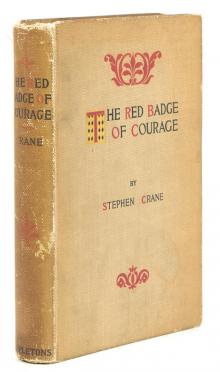 The Red Badge of Courage: An Episode of the American Civil War
The Red Badge of Courage: An Episode of the American Civil War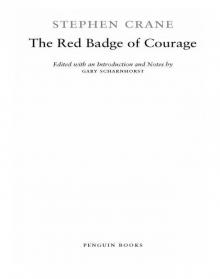 The Red Badge of Courage
The Red Badge of Courage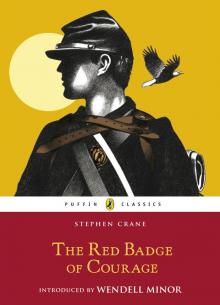 The Red Badge of Courage by Stephen Crane
The Red Badge of Courage by Stephen Crane Maggie, a Girl of the Streets and Other New York Writings
Maggie, a Girl of the Streets and Other New York Writings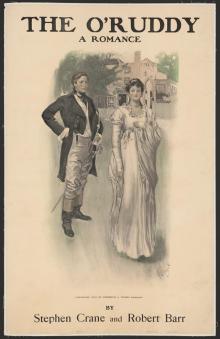 The O'Ruddy: A Romance
The O'Ruddy: A Romance The Third Violet
The Third Violet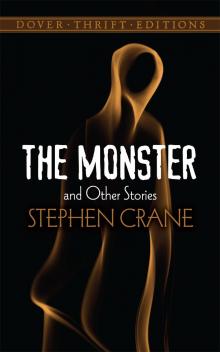 The Monster and Other Stories
The Monster and Other Stories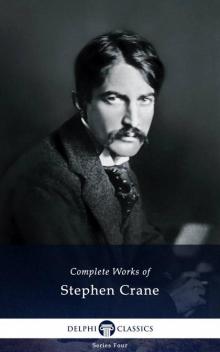 Complete Works of Stephen Crane
Complete Works of Stephen Crane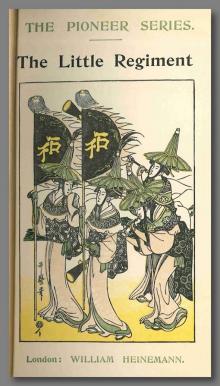 The Little Regiment, and Other Episodes of the American Civil War
The Little Regiment, and Other Episodes of the American Civil War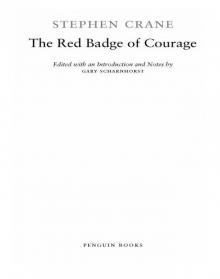 The Red Badge of Courage and Other Stories
The Red Badge of Courage and Other Stories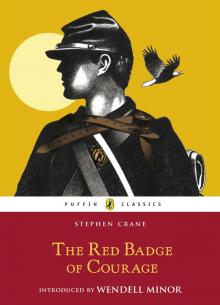 Red Badge of Courage (Puffin Classics Relaunch)
Red Badge of Courage (Puffin Classics Relaunch) The Fight: Whilomville Stories: XI.
The Fight: Whilomville Stories: XI. A Man and Some Others.
A Man and Some Others. The Monster
The Monster